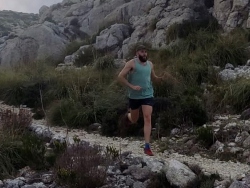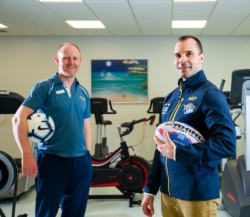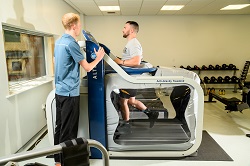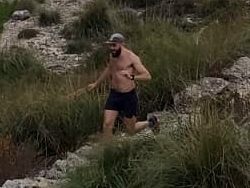Why you need a multi-disciplinary approach for rapid sports injury recovery
Get an insight to the treatment available at the Sports Medicine and Injury Clinic at Nuffield Health Leeds Hospital - read Henry's story
The multi-disciplinary Sports Medicine and Injury Clinic has been successfully treating patients for four years.
It attracts those serious about their sport, with the clinic’s big advantage of having the breadth of consultant-led clinical expertise working together: rapid access to expertise cuts down on time and waiting.
People who are passionate about sport and have had an injury use the facilities to accelerate their recovery and to get them quickly back to a pre-injury level of fitness and full activity.
Introducing runner and rock climber Henry.
Serious runner and rock climber, Henry Jeffreys, who developed major shin splints benefited from this comprehensive approach.
Henry was helped back on the road to recovery after taking advantage of a full clinical investigation and the expertise.

Henry explains: “At the end of January 2021 I was on a 14 mile run along the Leeds & Liverpool Canal, running slightly faster than I do normally and, unfortunately, wearing a pair of fairly worn out shoes. I started to experience some pain.
“I have had on and off issues with my shins in the past but this time it seemed to be pushing at the edge, making it difficult to walk and preventing me from running.
Meeting the experts at the Sports Medicine and Injury Clinic, Nuffield Health Leeds Hospital.
“I left it for a month because past occurrences have gone away but eventually enough was enough and I contacted my private health care insurer, which arranged an appointment with Anthony Burns, Senior Physiotherapist at Nuffield Health Leeds Hospital.
“Ant referred me to Dr Alastair Jones the consultant who runs the sports medicine and injury clinic because he was concerned about a possible bone stress response.
“This was really helpful. Alistair and the team put everything into perspective. We chatted about what the shin was and moved on to discussing diet and said they would run some blood tests as this could point to other indicators for various aspects of my recovery. An MRI scan was also arranged to rule out possible stress fractures. Luckily, it turned out just to be a bad case of shin splints with aggravation on the surface of the bone,” Henry said.
Henry’s diagnosis
Henry had been diagnosed with Medial Tibial Stress Syndrome (MTSS) an overuse injury or repetitive-stress injury of the shin area. This leads to various stress reactions of the tibia and pain can occur when the body is unable to heal properly in response to repetitive muscle contractions and excessive tibial loading.
This is common in runners and is linked to overtraining, as in Henry’s case. He had significantly increased his loading in training in preparation for a running event.“We suspected that was the case, confirmed by the MRI scan, which showed some bony response on his tibia” Anthony said.
Looking further than just the injury
To help in the diagnosis, the teams run a series of comprehensive tests including bone profiling and blood tests looking for vitamin deficiencies.
The physiotherapists looked at the biomechanical perspective, assessing the muscles to find out valuable data to use in building a rehabilitation programme to get Henry back to full activity. The teams at Nuffield Health Leeds Hospital also have access to an Isokinetic Tool that can evaluate muscle weakness and provides real time data to monitor progression.

As part of these wide-range of tests, the team also, if required, are able to do ultrasound imaging. This can be done immediately preventing patients having to wait. Ultrasound imaging enhances clinical decision making and ultimately accelerates management and intervention strategies for improving patient outcomes.
In Henry’s case, this was not needed, and the blood tests all proved to be OK, so the next step was to start advising on how to build his training load in a safe and sensible way.
Anthony explains: “We approach everything holistically, it’s all part of the service. We made sure Henry was aware of the diverse types of pain he could get so he understood what the distinct types of pains were and those he could ignore and those he most definitely shouldn’t ignore.
“We set about preparing a return to running programme in terms of how much volume he could do. It is a prescriptive programme geared around each individual.”
Aiding rehabilition and recovery: The AlterG Treadmill

To help Henry, Nuffield Health Leeds Hospital introduced him to the Anti-Gravity Treadmill (AlterG®), often described by those who benefit from using it as ‘an impressive piece of kit.’AlterG® enables patients and athletes to move unrestricted and pain-free – restoring and building muscle strength, range of motion, balance, function, and fitness.
The AlterG allowed Henry to control how much of his weight was bearing on his joints as he moved. By gradually increasing the load it helped Henry build up his strength and therefore be able to run again.
Henry commented: “The AlterG® treadmill was excellent. I started off at 60% of body weight and running for an hour then gradually building it up. Each time I would start off with slightly more body weight and also finish off with slightly more body weight. By the last session I started off at 85% body weight, finishing with a 15 min run at actual body weight.
“The AlterG® was a really valuable piece of equipment in my training. It’s not in my nature to be sitting still, I wanted to be out running, using this piece of equipment meant I could go on a run once or twice a week which was better than nothing. I got rid of my frustration and in a controlled way I was able to continue doing the thing I like doing whilst easing me back into it at the same time.”
Anthony is quick to point out that often frustration makes people cut corners. “Using our resources is a bonus. And for other types of athletes, we have other equipment like Watt bikes used by Olympic cyclists who are prepping for training.
“Plus, a shockwave machine which can be used to effectively treat overloaded tendon issues.
“Not every clinic will do shockwave or have access to it so it’s just another treatment option we have available here in at Leeds Hospital.”
A return to running programme
All this was available to Henry and towards the end of his treatment he talked through a return to running programme, setting realistic time frames, with Alastair and Anthony.
“The programme was easy to follow enabling me to gradually build up my running again without doing any damage. I also met with Dan Garbutt the Outpatient Clinical Lead, whose expertise in strength and conditioning helped greatly in the strengthening exercises, complementing the work I had been doing with Ant.
“Since the back end of summer, I am pretty much back to similar distances I was doing before the MTSS occurred and even managed to go running in the mountains in Mallorca during October. Last year all my running goals were suspended but thankfully they’re all back on for this year and I can now train and push forward rather than just getting back to where I was.
“The Initial diagnosis was really helpful. I just wanted to know what was wrong and rule out anything serious. The integrated approach from Nuffield Health Leeds Hospital team was excellent. A straightforward approach: this is what you have got, these are the reasons why it might have happened, this is how we are going to accelerate your recovery and working out how to prevent similar things happening in the future was really valuable.”
Helping you get back to beating those Personal Bests.

Anthony sums up the benefits: “Here at Nuffield Health Leeds Hospital we use a multi-disciplinary approach with quick access to state-of-the-art equipment and technology like imaging techniques and the AlterG®. All this along with the bone profiling and blood tests enables the medical team to provide evidence-based treatment plans whilst offering patients access to a fully equipped gym coupled with strength and conditioning advice. It’s like being in an elite professional sports environment but accessible for all”.
